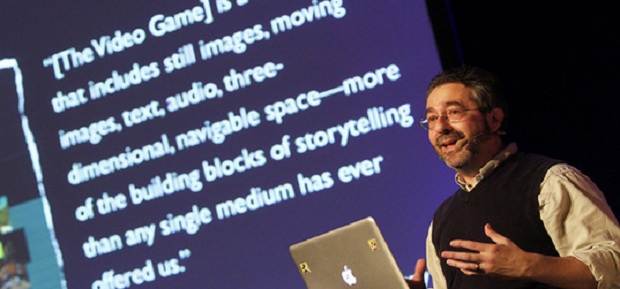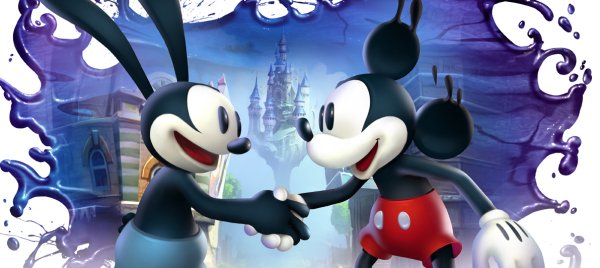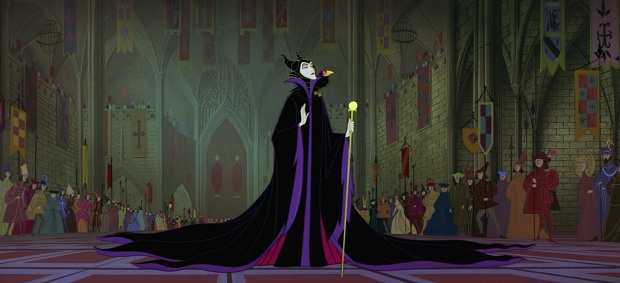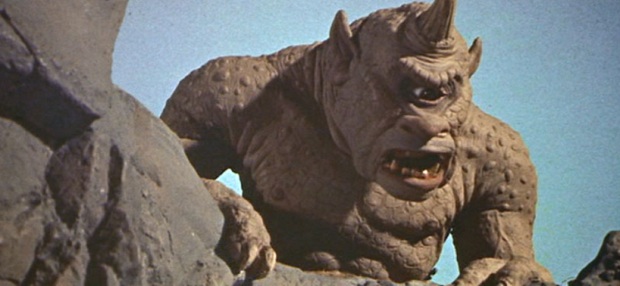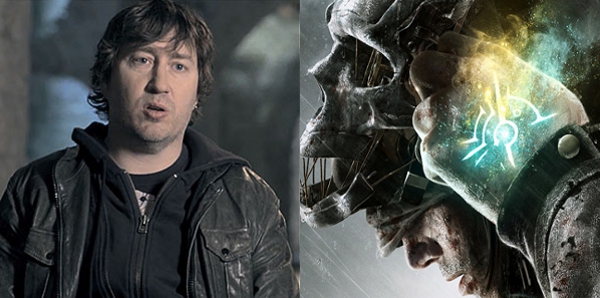Interview: Spector On Fears, Legacies and Returning To PC
By
Adam Smith on November 18th, 2013 at 7:00 pm.
There are a lot of words being written about the new consoles this week but when I spoke to Warren Spector a few days ago, he was clear about where his future lies: “I think all the interesting stuff is happening on PC now… Assuming I make more games, which I intend to do, PC and Mac are going to be my targets.”
It’s good to hear. We spoke at the Bradford Animation Festival and covered a wide range of topics, from his theories of design and pioneering role in PC gaming to thoughts on the current state of the industry. In this first part of our conversation, there’s insight into how Spector see his own legacy and the work of his former colleagues, and how frustrations with Thief’s difficulty inspired the player empowerment of Deus Ex.
Spector’s presentation included a trailer put together for the non-existent
Epic Mickey movie. It’s a lovely piece of work, with an animation style that captures the Disney characters but paints their edges with a sharpness at odds with the dreamlike backgrounds. The style of the storytelling, conveyed by the animation and the dialogue, isn’t gritty or edgy – it’s a dark take on Disney, sure, but the mood is melancholy. Epic Mickey is, after all, a story about forgotten things.
Of all the things that he has helped to create, Spector seems most proud of something not entirely his own: he is uncharacteristically lost for words when he describes the amazement he feels in seeing Oswald the Lucky Rabbit resurrected.
“If you go to a Disney park or merchandise store and see Oswald there, that’s because of a game.”
That part is characteristic. In the time that I spoke to Spector, he did express pride in his work but reserved the majority of the credit for his colleagues. There’s more to the Oswald statement though – he’s not pleased that
his game resurrected Oswald, he’s pleased that
any game can have that influence on a forgotten Disney character who is more than eighty years old.
As a lover and student of both cartoons and film, Spector recognises that what people dismiss as silly and inconsequential can have a profound influence, just as the Disney and Harryhausen films that helped to shape him did.
“I discovered movies when I was about two but I became a serious student of film when I was fifteen. I think that informs everything that I do but I don’t think it’s so much that cinematic technique informs my work, it’s that I saw first-hand how a medium could be judged just as entertainment, or as a waste of time, but clearly be an art-form, and so I saw the potential in videogames from the start to be more than a way for kids or adults to waste time, but to be something more. I think that came from my background as a film critic.
“A lot of people keep saying ‘where is our Citizen Kane, where is it?’ A lot of people think
BioshockInfinite is it, some people say
Deus Ex is it. People look for the moment that we became an artform. I think we became an artform with
Pong. Maybe even
Spacewar for crying out loud.
“My first actual conscious memory is my dad taking me to see The
7th Voyage of Sinbad. There’s a dragon and a Cyclops. That movie gave me nightmares. Ray Harryhausen is one of my heroes and I got to meet him – he was everything you’d want a hero to be, and that was awesome. Sinbad changed my life. And then when I was three I saw
King Kong. It gave me nightmares for years. I was about two or three when I saw
Sleeping Beauty for the first time, and Maleficent turns into a dragon and the forest that the hero has to carve his way through. You think about
Alice in Wonderland, you think about Snow White, when the trees turn into alligators. All these scary scary moments that turn you into a fantasist.”
There’s a biographical similarity here. We may be from different times and different places, but when I tell Spector that I was always drawn to films with moments of darkness, he nods in agreement.
For me, it isn’t Sinbad and Sleeping Beauty – it’s Star Wars and Indiana Jones. Films that exist in worlds of adventure, where heroes are invincible and threats are often more slapstick than sinister. It’s the moments when something horrible tears through into the carefree, a reminder that terrible consequences are possible, that left pleasant little scars on my psyche. It’s often the villains who suffer, for meddling where they shouldn’t, and the fact that my younger self was rooting to see them defeated made their fate even more troubling. I’d willed their faces to melt.
We talk briefly about these kinds of stories and I ask Spector if he has any thoughts as to why he was drawn to the dark side. “We’d need years of therapy to answer that”, he laughs. “I think the contrast is important, as you say. I showed a vertical slice of an early Epic Mickey build in my talk and it was dark and gray. And I said to the art team, we need more contrast. We want a game that’s dark, but we need the light, we need the contrast. I think you just hit on that – the scary moments work in those classic Disney films, and even in
Jason and the Argonauts or
Invasion of the Bodysnatchers or a Hitchcock film, because they show a happy world and snatch it away from you.”
How does that compare to System Shock or Thief, games which contrasted their darkness against more darkness? Before moving on to discuss System Shock, Spector interrupts himself with a brilliantly unexpected two sentence anecdote.
“Here’s a fun fact – my first D&D dungeon master was
Bruce Sterling, the father of cyberpunk fiction. The best dungeon master on the planet too, by the way.”
I’m sorely tempted to ask Warren if he’ll come and be my dungeon master for a while but it seems wildly inappropriate in many ways.
“System Shock came out of that cyberpunk tradition. Those games are very oppressive but I think in a game and in certain genres there are somewhat different expectations. In
Blade Runner they didn’t have to show a bright, happy world. Certainly when you’re doing something like an Ultima game or a Mickey Mouse world, you’re obliged to show the bright happy world. Like Alice in Wonderland too, that starts in a nice English garden and then descends into madness.
“I have to be very careful about Thief because I get a lot of credit for that game but in fact I worked on it for the middle year of a three year cycle. That started out as Doug Church’s concept and he was the one that drove it in a particular direction.”
Since learning about Thief’s earlier incarnation as
Dark Camelot, I’ve wondered how late in development the setting changed, so I asked Spector what the title was when he joined the project in its second year. That’s when I found out that Ken Levine, ever the pioneer, wanted to make a zombie game.
“It was still Dark Camelot. Ken Levine actually wanted to do Better Red Than Undead, a zombie game, which was way ahead of its time!”
That would have changed the entire history of gaming. As it happens, history nearly did change and if Spector had been more pushy or the team had been less sure of themselves, it might have done.
“I had arguments with the team about Thief quite a lot in the year I worked on it. I wanted more contrast and there were parts of the prototype that I just wasn’t good enough to sneak past so I kept on saying, let me fight my way through. They never backed down and it was the right call. I’m so glad they didn’t give in to my requests! A lot of Deus Ex came out of my frustration with Thief, which is a game that I love, but I wanted to make something a little different and Deus Ex was the result of that.”
During our all-too-brief meeting, Spector is never as animated as when he’s talking about the people he’s worked with. I ask if he thinks about his legacy, aware that it’s a slightly preposterous question to ask somebody who has been so careful to avoid taking too much personal credit for its work.
He sighs, smiling. “Oh God. Yeah, I do, I do. It’s a little embarrassing to admit though. I think a lot about the word ‘legacy’. I think it’s a function, at heart, of being the oldest guy in game development. (laughs) It’s funny because I used to always be the youngest guy in every circle I was part of and now I’m always the oldest.
“When you start getting older you stop caring about a lot of the things that you cared about when you were a kid, and you start thinking about leaving something behind. I don’t have kids, so I’m not leaving my DNA behind, but I hope the DNA of the games I’ve worked on lives on. When I see things like
Deus Ex: Human Revolution, I realise I was part of a team that created something that’s bigger than us and that’s really cool.
“The fact that our kinds of games are making a resurgence is great. They never went away completely but there was a period where it was the hot thing and then it kind of cooled off. There was a period where it was just me, and maybe Bethesda and Peter Molyneux a little bit, and then it kind of died off. And then out of the blue, it’s back – I think you’d have to look to Bioware picking up on these things with
KOTR and
Mass Effect, and I think
Skyrim taught people some stuff.
“And then there’s the
GTA guys. Rockstar just kept going and going with open world games. That all made a difference. The biggest change – and I don’t know why this happened – but people are interested in story again. I came from a tradition of storytelling but I’ll never forget – and this is a quote by the way – I was at a product meeting at Eidos and I was told, “Warren, you’re not allowed to say the word ‘story’ ever again.
“It blew my mind. Now, nobody’s saying that. Everyone wants narrative games and it’s a question of asking how we tell interactive stories. And we have the gamut now, everything from
Telltale with The Walking Dead and The Wolf Among Us, and Beyond and Heavy Rain from David Cage at one extreme of storytelling, and somewhere in the middle Bioshock Infinite and the stuff that Valve does, and then at the other end the kind of games that Bethesda’s making and that I like to make. It’s the other extreme in terms of player empowerment. We have every extreme of narrative experience out there, which is great for gamers.”
Amidst the games, there’s a personal element to Spector’s legacy as well and when he talks about that, he seems at his most contented.
“When I see
Harvey Smith or
Randy Smith, or
Jordan Thomas who worked on the Bioshock follow-up games – when I see those guys going off and doing their thing, that fills me with pride. That’s what Looking Glass and Origin, and whatever role I played in those studios, left behind. That’s our legacy.”
Part two will follow shortly, with conversation about King Kong’s scary mechanical arm, growing up in a world without games and the current state of the industry, and how to improve it.







![Have Many Potato [2013] Codex 2013](/forums/smiles/campaign_tags/campaign_potato2013.png)
![The Year of Incline [2014] Codex 2014](/forums/smiles/campaign_tags/campaign_incline2014.png)





















![Glory to Codexia! [2012] Codex 2012](/forums/smiles/campaign_tags/campaign_slushfund2012.png)

